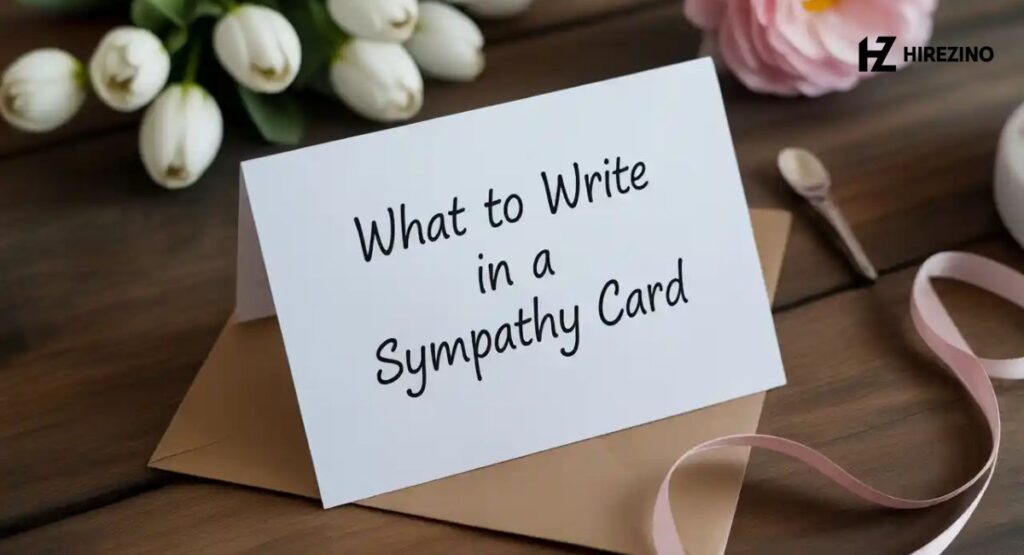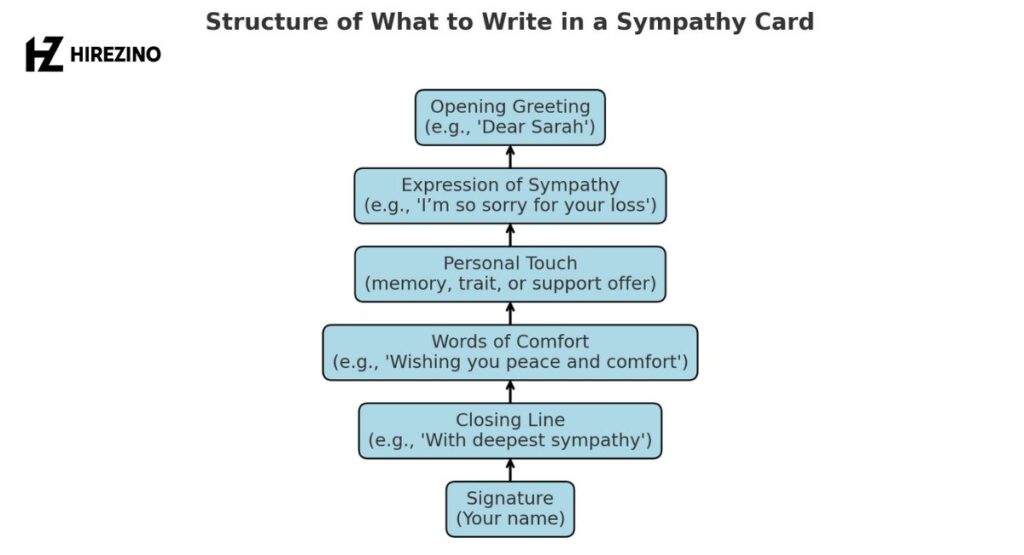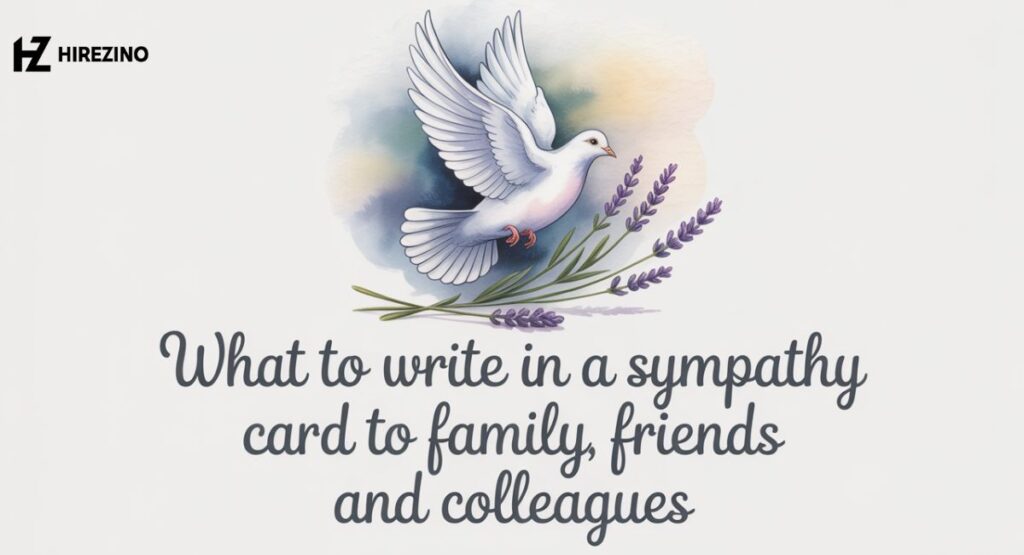Composing a sympathy card may be daunting, more so when you do not know how to write in a sympathy card. It is not only about writing them on the paper but a form of providing a well-meaning sympathy and demonstrating that you really care at a trying moment. Is it a card to a close friend, a family member or a work mate; the right selection of words can ensure comfort and reprieve to a bereaved family.
Striking the chord between expressing emotions and not being mushy is something that a lot of individuals fail to do, but even short and sincere messages can work wonders. I am very sorry about your loss, or I am thinking of you in your bad time are said with good mind and empathy, good ways of saying goodbye. Knowing what to write in a sympathy card will definitely ensure that the words you write are not only welcome but also reassuring and help a person feel connected when he or she is most required.
Why Sympathy Cards Matter
Silence may be lonely when individuals have to deal with the loss of a family member. A card containing compassionate sympathy makes them realize that they are not the only ones. Making the expressions of sympathy are not just socially obligatory expressions of caring, as they offer warmth in the dark days. The comforting words written down in a personal note provide the grieving with a bit of stable ground.
In the USA, it is a tradition and emotional support to send a card. Families store the messages of memorization and read them many years after the funeral. These are mere sentences which turn into pillars of hope. In case you do not know what to put in a sympathy card, consider it as sending messages with longer lasting effects than verbal expressions.
What to Write in a Sympathy Card

When making a decision as to what to say in a sympathy card most individuals develop a freezing response. Begin by being sincere, i.e., saying things like: I am so sorry you lost your person or please accept my condolence. p.–Then add mourning words, which suit your voice. Even some brief notes of sympathy can be very powerful.
Wrap up your card with pleasant things such as remembering you in my thoughts or with my deepest sympathy. You can also come up with the funeral sympathy messages like our thoughts and prayers are with you. When you have put your heartfelt condolence on your card, then you provide courtesy and care.
Sympathy Card Message Examples
It makes it easy to write your own in a manner that is a result of seeing some samples. Here are some examples to what to say on a sympathy card in case you are at cross roads. To family: I am so sad to hear it. To friends: peace and comfort be to you. To co-workers: and wishing you think of me in this sore time.
Another way of comforting is possible and sympathy can be shown using comforting quotes. Your struggle can be your power in memories, or your loved one legacy will remain. These are ready prepared lines that are bereavement support, which are however personal. It has short variations that you can make as shown in the table below.
| Relationship | Example Message |
| Family | “holding you close in my thoughts” |
| Friend | “sending healing prayers and hugs” |
| Colleague | “you’re surrounded by people who care” |
Condolence Messages by Situation
Each loss has its own weight. Consider the relationship when you are making a decision about what to say in a sympathy card. To a widowed spouse, a shoulder to cry on is a sign of intimacy. To a bereaved parent, sharing in your sadness, is a great show of solidarity. The condolence messages are supposed to correspond to the loss.
At work places, express sorrowful messages about funerals in a professional but friendly manner. Talk about coworkers by saying that you are thinking of you or that you would like them to accept your condolences. To the neighbors, include, write in loving memory or wanting you to have peace and comfort. Equity in the situation and matching of the messages of support assists in equipping actual support in grieving.
Short & Simple Sympathy Messages
Not all notes need to be long. Occasionally small sympathy notes will count the most. You can include deepest sympathy or in my thoughts. It does not focus on length but rather on sincerity. You do not need to be a poet to know what to say in a sympathy card, you simply needed to be there.
Often just two sentences can make good condolence. Attempts to send love, thoughts and prayers or you are not alone in your grief. These are simple words to write, and powerful enough to convey comforting words. A mere message can be building silently in the heart of a person over a period of time.
Religious Sympathy Messages

Religion tends to bring individuals through the difficult days. Among Christians, religious messages like condolence messages like may God give you peace or our thoughts and prayers with you are effective. Biblical verses or healing prayers can prove to be very empowering when one does not know what to write in a sympathy card.
Tradition is respected by expressions such as sharing in the sadness of your Jewish friends or may your memory be blessed. To others, neutral, but spiritual messages like sending healing prayers and hugs are comforting. When selecting funeral sympathy messages, always remember that you must always respect the faith of the grieving family.
What NOT to Write in a Sympathy Card
It is sometimes simpler not to make mistakes by knowing what not to say. Such platitudes as time heals all wounds should not be written. Instead, learn what to write in a sympathy card that avoids minimizing grief. Sayings like, at least they are better off make little a difference to a grieving family.
Assumptions should never be made concerning religion in case you are not aware of their beliefs. Avoid such comparisons as I know how you feel, which can be hurtful. Instead, use words that are reassuring like my heart goes out to you or may I wish you peace and comfort. Never use empty expressions instead of heartfelt sympathy.
Tips for Writing a Thoughtful Sympathy Card

When you sit down to write, use the person’s name. If you wonder what to write in a sympathy card, share a small memory or trait. Saying “Your loved one was kind and warm” feels far more personal than any generic phrase. Add expressions of sympathy that show attention to detail.
Offer real help too. It does not take words to write that one should have a shoulder to lean on or I will bring you a meal next week. Written notes are more personal than written ones. Cards containing a combination of a heartfelt concoding message and action demonstrate genuine bereavement support. Readers remember words of comfort most when backed by care.
Additional Support Resources
Even after sending a card, more help is often needed. Besides understanding what to say in a sympathy card, consider sharing materials. In the USA, agencies such as GriefShare or National Alliance of Grieving Children provide the support in grief. These resources expand comfort beyond paper.
Books, podcasts, and local counselors also offer bereavement support. Sharing a link or resource alongside messages of support shows extra effort. When combined with memorial messages and comforting quotes, these tools help the grieving family feel connected long after the funeral ends.
Final Thoughts
No one has the ideal template to work out sorrow, words can heal things better than we think. The greatest consideration, in making decisions regarding what to write in a sympathy card is the honesty and care. Such phrases as with deepest sympathy, my heart goes out to you, or thinking of you in this difficult hour can help other people feel that they are being clinged to.
Lastly, a few words may give light to an individual in the darkness. No matter how touching, religious or short the message of condolence is, you remind people that they are not alone. You may always also write kindly and your message will be added to their healing process.
CONCLUSION
It is not necessarily simple to write a sympathy card. Learning to write in a sympathy card may assist you in showing care. Several mere words can console a bereaved family or a friend. Your words are less important than your message when you are writing out of the heart.
Always remember what to write in a sympathy card should be honest and kind. Short expressions such as I am really sorry about your loss or thinking of you in these trying times may be used. Even small notes show love and support. When unsure, keep it simple. What to write in a sympathy card is about offering warmth, not advice. Your words can bring peace and healing. Take your time. Your message matters. What to write in a sympathy card can make someone feel less alone and deeply cared for.
FaQs
What is the best condolence message?
I’m so sorry for your loss. Thinking of you during this difficult time.
What’s a good opening line for a sympathy card?
Please accept my condolences on your loss.
What to say instead of deepest sympathy?
You can say wishing you peace and comfort or holding you close in my thoughts.
What to say to someone who has lost a loved one?
You’re not alone in your grief. I’m here for you.
What are comforting things to say?
May you find strength in memories or sending love, thoughts, and prayers.
What is a positive quote after losing a loved one?
What we once enjoyed and deeply loved we can never lose, for all that we love deeply becomes part of us.

